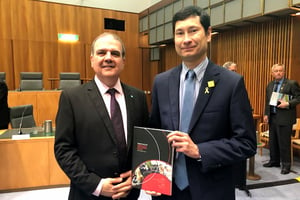No more road deaths by 2050. That’s the ambitious target presented to government among the findings of the independent inquiry into the National Road Safety Strategy.
The findings, accepted in Canberra by Deputy Prime Minister and Minister for Transport Michael McCormack, include 12 key recommendations to reduce road trauma.
ARRB’s Michael Caltabiano – the Chief Executive Officer of the national transport research organisation - was among those in the roads and transport industry present in Canberra to hear the findings handed down.
The 12 key recommendations are:
1. Create strong national leadership by appointing a Cabinet minister with specific multi-agency responsibility to address the hidden epidemic of road trauma including its impact on the health system.
2. Establish a national road safety entity reporting to the Cabinet minister with responsibility for road safety.
3. Commit to a minimum $3 billion a year road safety fund.
4. Set a vision zero target for 2050 with an interim target of vision zero for all major capital city CBD areas, and high-volume highways by 2030.
5. Establish and commit to key performance indicators in time for the next strategy that measure and report how harm can be eliminated in the system, and that are published annually.
6. Undertake a National Road Safety Governance Review by March 2019.
7. Implement rapid deployment and accelerated uptake of proven vehicle safety technologies and innovation.
8. Accelerate the adoption of speed management initiatives that support harm elimination.
9. Invest in road safety focused infrastructure, safe system and mobility partnerships with state, territory and local governments that accelerate the elimination of high-risk roads.
10. Make road safety a genuine part of business as usual within Commonwealth, state, territory and local government.
11. Resource key road safety enablers and road safety innovation initiatives.
12. Implement life-saving partnerships with countries in the Indo-Pacific and globally as appropriate to reduce road trauma.
The report was chaired by Associate Professor Jeremy Woolley, director of the Centre for Automotive Safety Research at the University of Adelaide, and John Crozier, chair of the trauma committee at the Royal Australasian College of Surgeons.
You'll find the Inquiry Fact Sheet here
